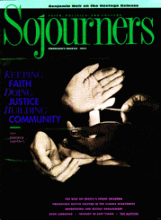What a homecoming it is! One after the other we have seen hostages held in Lebanon set free. Tom Sutherland and Terry Waite, Joe Cicippio and Alann Steen, and the last American captive, Terry Anderson. We wish the same for two Germans, Thomas Kempner and Heinrich Streubig.
These are days we have prayed for and anxiously awaited. What a joy to see families reunited, banners waving, crowds cheering, television cameras rolling. The former hostages remember the grim shadows of loneliness, lost years, times of illness, dark cells, and days of beatings. The shadows are there, but they are in the background. Now is a time to reconnect, to take a fresh look at what the experience teaches, to pause and recoup one's resources and then to make a new beginning.
It is a kind of baptism, passing through death to life. That new life has brighter colors and a more determined purpose for them, and even for the rest of us who have prayed for them and felt with their families and loved ones. It is a time for unreserved gratitude to God and rededication of our lives to seek God's purposes for ourselves and our world. Humanity is not forgotten. Divine presence remembers, renews, restores hope.
Soon we can relax. Hostage taking will become a bad memory of the past and we can put it to rest. Or is it really that easy?
Perhaps we are beginning to learn that opposing others is not enough. We must actively contribute to peace, reconciliation, and resolution of conflict.
One thing we dare not forget is that frustration leads to extremism and violence. Young Lebanese Shiite Muslims who saw their jobs dissolve in a shattered economy were desperate to survive. When their loved ones were killed or injured by Israeli or Phalangist forces, they took up the gun. When towns and villages were crushed by the advancing Israeli army, they were incensed.
Read the Full Article

